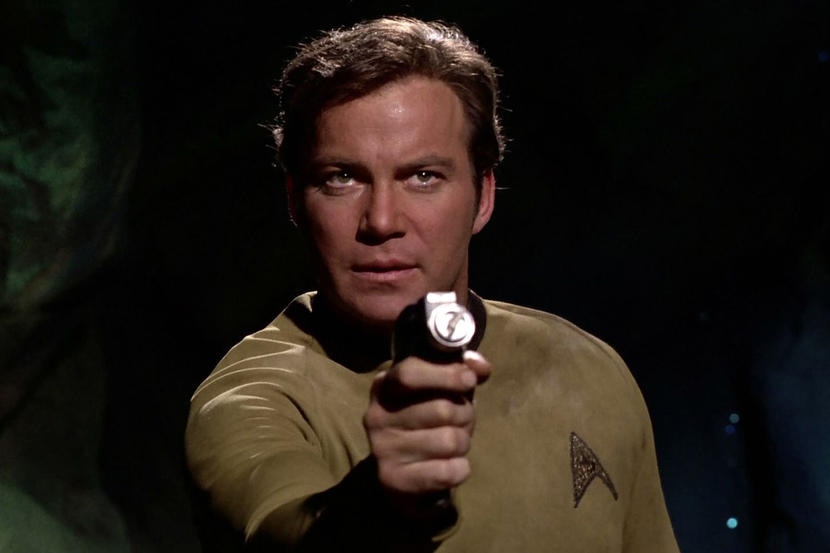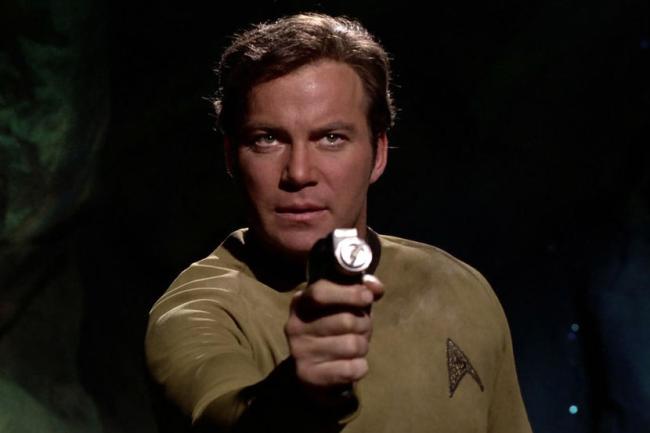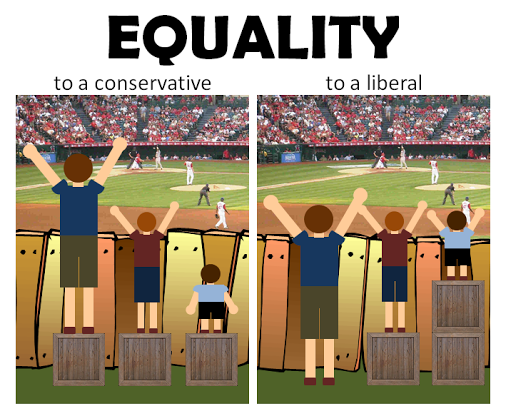Today In Disappointing: William Shatner Cries “Misandry,” Proving That Fans Understand Kirk Better Than He Does


On Twitter yesterday, William Shatner got involved in a discussion about misogyny and its imaginary counterpart, “misandry” (you know, “reverse racism’s” cousin?). What’s interesting is that the discussion, as well as his disappointingly sexist comments, were the result of a fan tagging him in an article that the fan completely misunderstood.
It all started when a fan tagged Shatner in a tweet linking to a Boing Boing article titled “On ‘Kirk drift,’ the strange mass cultural misremembering of Captain Kirk“:
When they go after God (i.e., @WilliamShatner), it’s time to start talking about “toxic femininity.”#equalityhttps://t.co/CjgzVTLyZ4
— Alexander Boldizar (@Boldizar) April 30, 2017
Now, if one skims that Boing Boing post without actually reading it, doesn’t go look at the link it’s promoting—in this case, an essay at Strange Horizons by Erin Horáková—and only catches words like “heterosexism,” “chauvanist” and “toxic masculinty,” one might jump to the conclusion that an article with that title is coming down hard on beloved hero, Captain Kirk.
And since the man who plays Kirk is apparently “God,” that might seem like an especially pressing concern. And so, this gentlemen made his god aware of the situation. However, when his followers chimed in to let him know that the article about which he was speaking was actually quite complimentary toward Captain Kirk, and that its criticism was not about Kirk’s sexism, but about the sexism inherent in the way we seem to collectively misremember him, he said:
Agree it’s not a direct attack, but reinterpretation: Kirk as careful, flaccid & humourless as Picard. Kirk was not sexist, but he was bold. https://t.co/Y7IMYfRTmC
— Alexander Boldizar (@Boldizar) April 30, 2017
And also this:
@dmfletch17 No, I misread the BoingBoing summary, which was misleading.
— Alexander Boldizar (@Boldizar) April 30, 2017
Ah yes. The Boing Boing article was misleading. Even though it says nothing much on its own, but encourages the reader to go read this other thing, you know, for context: this thing that talks about how “‘Kirk drift’ is connected to toxic masculinity, history, culture, and so much more.”
In other words, the Boing Boing piece isn’t actually a piece, but rather encourages you to read a different piece. It’s not something that’s designed to be commented on in and of itself, as it posits no opinion of its own. It’s just saying, Hey, you should check out this other thing that’s really cool!
But comment Alexander did, and his uninformed comment led to William Shatner responding thusly:
Feminism is great but terms like toxic masculinity are degrading. It borders on that imaginary concept to feminists: misandry. https://t.co/capA1J4q44
— William Shatner (@WilliamShatner) April 30, 2017
He then proceeded to RT anyone who reached out to correct him while deriding or misrepresenting them:
Whatever you say my dear. https://t.co/s0vMEzk5xb
— William Shatner (@WilliamShatner) May 1, 2017
You can say that about misandry all you want but it exists. ♂️ https://t.co/fKhNpEt6h1
— William Shatner (@WilliamShatner) May 1, 2017
You just keep believing it doesn’t exist and keep on hating men. I’m sure it makes you sleep better at night. https://t.co/dnQBSYThr9
— William Shatner (@WilliamShatner) May 1, 2017
Even more infuriating is when he claims to have respect for the cause of gender equality while continuing to misunderstand how inequality works:
Misogyny exists. Problem is that she didn’t want to accept misandry does, too. https://t.co/f1mlk7wKek
— William Shatner (@WilliamShatner) May 1, 2017
I disagree. The original feminist movement was about equality. Somewhere along the line a few decided differently. They are the exceptions. https://t.co/Dgy9rGuVhj
— William Shatner (@WilliamShatner) April 30, 2017
OK, so the current feminist movement isn’t about equality? It’s about making women better than men? Huh. That’s weird, because last I checked, today’s feminists were still asking for things that men already have, not anything more than men have. Things like, you know, equal pay, agency, accurate media representation, freedom from gendered violence, and for the feminine not to be looked down upon as “weak.”
Before I get into speaking directly to ‘misandry,’ here’s the tl;dr version in image form, courtesy of Craig Froehle:

Those who mention “misandry” do so to try to give it equal weight as “misogyny,” and they are missing a huge element that this simple image highlights very well: privilege. For example, in the image above, the “Conservative” side thinks of equality as everyone being given exactly the same resources (in this case, a box to see over the fence). After all, if you work hard, you should be able to make the most out of what you have and get ahead, right?
Well, no. As we see, just because everyone has a box doesn’t mean everyone gets to enjoy the baseball game. One box helps people who already have the privilege of height, but for those who don’t, they need more than one box, or they miss out. When we talk about equality, we’re talking about equality of access. Equality of participation. We see this in the “Liberal” image on the right, where the smallest child is given two boxes, which is more boxes than the others have, but now that small child can see just as well as they can. That’s the equality we need.
And so, when Shatner brings up misandry as if it’s in any way the same as misogyny and deserves the same level of scrutiny, it’s hugely ignorant, irresponsible, and sexist. Are there women out there who hate men? Of course there are. But what does that hatred actually do to men, especially when you consider that a lot of that hatred is based in legitimate fear (women are more likely to face violence at the hands of men, be objectified by men, be paid less than men, be forced to deal with the consequences of having children in a way men will never be)?
Women fight misogyny because, collectively, we’re afraid of men, and we’re afraid of men, because they have systemic power over us that they guard viciously. That fear can manifest itself in many ways. For some women, that fear becomes hatred of men. For others, that fear becomes ingratiating themselves to men (after all, you need to get in good with the side that can give or take away from you if you want to survive). Still others—and I would argue this is most feminists—are able to see beyond our fear just enough to expect better of men.
We believe in equality of access, and think men capable of understanding that need. We don’t believe that men are inherently violent, but that they’ve been taught and trained to be that way over centuries, yet are capable of unlearning that if they try. We believe that men are totally capable of being nurturing and loving, but that they’ve been brought up to believe that these qualities aren’t “manly.” That they’re weak—the way women are.
Yet all women, no matter where on the fear spectrum we fall, are the little kids trying to see the game over the fence like everybody else, except that every time we reach for a second box (not from the taller children, mind you, but boxes of our own), we get beat up.
If the two older children in the above image kept beating up, belittling, or otherwise erasing/ignoring the smallest child, wouldn’t you think, after a while, that child would have good reason to hate those older kids? You wouldn’t begrudge that child their hatred, and it’s likely that, if the taller kids hated that smaller kid simply for trying to grab another box to see better, we’d think those kids were being hugely unfair.
Why is that so easy to see in this image, but somehow more difficult to see in the case of women or other marginalized groups?
Perhaps it’s not that it “can’t be seen” so much as it’s consciously ignored. Those who continually bring up “misandry” likely know that things are unfair for women, and they know just how unfair. However, they don’t want their lives to change in any way, because they know how good they have it, so they derail any conversations about equality with cries of “misandry” so that nobody looks or thinks too hard about what would be required to achieve actual equality.
This line of “argument” is especially disappointing from Shatner, because one would think that years of playing and being associated with a character who, as Horáková describes him is (when you actually watch the episodes and are not just operating from society’s collective memory of him) “a big nerd who punches people sometimes, but also memorises poetry and has nice chats with Spock’s mom and loves the ship intensely. He’s less tasked with enacting toxic masculinity in all its forms than many a contemporary male lead” would’ve had more of an effect on him and his way of thinking.
Horáková’s essay, which you really should read, describes “the sheer distance between the reality of Kirk and the idea of the danger-loving space sexist.” I wish we could make that same distinction for Shatner. Sadly, his own words speak for themselves. I just hope that, rather than continuing to be condescending toward those who disagree with him, that he stop and think for a second about what he’s saying.
(via Twitter, image: CBS)
Want more stories like this? Become a subscriber and support the site!
—The Mary Sue has a strict comment policy that forbids, but is not limited to, personal insults toward anyone, hate speech, and trolling.—
Have a tip we should know? [email protected]